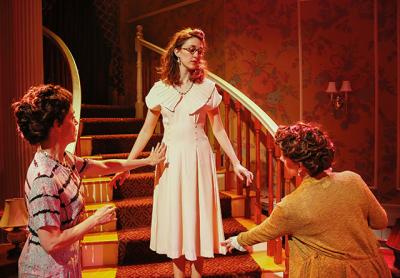Hullabaloo for ‘Ballyhoo’ in Sag Harbor

Fans of Hamptons regional theater take note: Run, don’t walk, to the Bay Street Theater’s current adaptation of “The Last Night of Ballyhoo.” It’s the best local production since last year’s “All My Sons” at Guild Hall, which rose to Broadway-level quality.
The playwright, Alfred Uhry, who was commissioned to write “Ballyhoo” for the 1996 Olympic Arts Festival, is also the author of the more widely known “Driving Miss Daisy.” Much like that play, “Ballyhoo” deals with the South and its thorny relationship with race, this time as it concerns Jewish identity.
The setting is 1939 upper-middle-class Atlanta, where Adolph Frietag, owner of the Dixie Bedding Company, lives with his sister, Boo, and sister-in-law, Reba, both widows. The laid-back Adolph, himself a bachelor, has his hands full with this house full of women — especially the domineering and class-conscious Boo, who suffers crushing embarrassment at her daughter Lala’s various social mishaps. (Lala did not, for example — gasp! — get into the right sorority at college.)
As the play opens, the Freitags are trimming a Christmas tree, symbolizing their relaxed approach to their Jewish heritage in a mostly Christian South. When Joe Farkas, a new employee of Adolph’s, arrives for dinner one night, he is startled by the Christmas display. He is from New York — Brooklyn, as Boo drawls derisively — and is much more observant of traditional Judaism.
Tensions mount as Joe becomes involved with Reba’s daughter, Sunny. He is the “wrong kind” of Jew, apparently, Eastern European rather than German. When Joe invites Sunny to the Ballyhoo — a lavish ball sponsored by a local Jewish country club — the play heads to its climax.
While Mr. Uhry’s play is crisply funny and adept at navigating the challenges of ethnicity and religion, it doesn’t have the lyricism or complexity of that other Southern master, Tennessee Williams. It is essentially a light-hearted comedy with dashes of conflict. It is a credit, then, to this sterling Bay Street production that it raises Mr. Uhry’s material to a level that transcends the written work.
This begins with Alexander Dodge’s terrific set, which captures the slightly sterile upper-middle-class life of the Freitags, and includes a wall panel that ingeniously becomes the passenger car of a train. But under the direction of Will Pomerantz, it’s the performances that make this “Ballyhoo” special. To a person, this superior ensemble wrenches huge laughs and genuine emotion from Uhry’s play.
Daniel Abeles, for example, is so comfortable embodying the privileged arrogance of Peachy Weil that the character’s irritating refrain of “What do you think?” comes off as almost endearing. And John Hickock approaches the good-natured Adolph with just the right laconic sense of humor, as when he is asked what he thinks of Peachy deciding that he will marry Lala and come to work at with him at his bedding company: “What do you think?” Adolph replies, nearly bringing the house down.
Ellen Harvey finds a commanding presence as Boo, stalking the stage with an imperious gait and delivering her zingers with a haughty drawl. But it is the characters of Sunny and Joe, played by Amanda Kristin Nichols and Ari Brand, that give the play its emotional heft. Mr. Brand summons his Eastern Parkway Brooklyn accent to perfection, and his tone, as he inquires (and sometimes jabs) at the Freitags’ Southern Jewish ways, are always searching rather than hectoring. Ms. Nichols, in perhaps the play’s best performance, finds a balance between disgust at the tired tradition of Ballyhoo and respect for an even older one: traditional Judaism. Her chemistry with Mr. Brand comes off as real, and their conflicts are genuinely wrenching.
After all the laughs, the play concludes on a thoughtful, somber note that suggests Joe has brought a new sense of purpose to the Freitags’ religiosity. It is the eve of the rise of Hitler, and this quiet, melancholy coda rightly concludes the funniest and most flawlessly acted drama to hit the Hamptons this year.
“The Last Night of Ballyhoo” runs through July 24.
